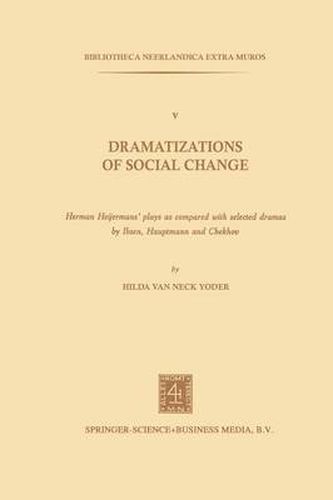Readings Newsletter
Become a Readings Member to make your shopping experience even easier.
Sign in or sign up for free!
You’re not far away from qualifying for FREE standard shipping within Australia
You’ve qualified for FREE standard shipping within Australia
The cart is loading…






This title is printed to order. This book may have been self-published. If so, we cannot guarantee the quality of the content. In the main most books will have gone through the editing process however some may not. We therefore suggest that you be aware of this before ordering this book. If in doubt check either the author or publisher’s details as we are unable to accept any returns unless they are faulty. Please contact us if you have any questions.
Herman Heijermans (1864-1924) was convinced that he lived in an overgangs 1 tijdperk, a transitional period. As a young man in the eighteen nineties, he rejected those values and life styles which he felt belonged to the past period dominated by the bourgeoisie, and sought out situations and a profession which would attune him to the future when, he hoped, the proletariat would 2 be in power. He left the conservative business milieu of Rotterdam in 1892 and went to Amsterdam- then teeming with radical ideas. At first, Heijermans was attracted to a group of poets, de tachtigers, who were claiming to have enlivened the stale tradition of Dutch poetry by discovering language and beauty in a totally new way; but soon he felt them to be elitist. Then, in 1895, he became a member of the newly founded Dutch Social Democratic Workers Party. He alienated himself from the literary circles by claiming that art should be socialistic and by rejecting the class separation between artists and workers. He felt himself to be one with the proletariat and, through them, with The New Life and The New Humanity.
Stimulated by the ongoing theater revival, which he interpreted as an attempt to challenge the bourgeois smugness and moral self-righteousness, he had started to write plays before becoming interested in the Socialist Party.
$9.00 standard shipping within Australia
FREE standard shipping within Australia for orders over $100.00
Express & International shipping calculated at checkout
This title is printed to order. This book may have been self-published. If so, we cannot guarantee the quality of the content. In the main most books will have gone through the editing process however some may not. We therefore suggest that you be aware of this before ordering this book. If in doubt check either the author or publisher’s details as we are unable to accept any returns unless they are faulty. Please contact us if you have any questions.
Herman Heijermans (1864-1924) was convinced that he lived in an overgangs 1 tijdperk, a transitional period. As a young man in the eighteen nineties, he rejected those values and life styles which he felt belonged to the past period dominated by the bourgeoisie, and sought out situations and a profession which would attune him to the future when, he hoped, the proletariat would 2 be in power. He left the conservative business milieu of Rotterdam in 1892 and went to Amsterdam- then teeming with radical ideas. At first, Heijermans was attracted to a group of poets, de tachtigers, who were claiming to have enlivened the stale tradition of Dutch poetry by discovering language and beauty in a totally new way; but soon he felt them to be elitist. Then, in 1895, he became a member of the newly founded Dutch Social Democratic Workers Party. He alienated himself from the literary circles by claiming that art should be socialistic and by rejecting the class separation between artists and workers. He felt himself to be one with the proletariat and, through them, with The New Life and The New Humanity.
Stimulated by the ongoing theater revival, which he interpreted as an attempt to challenge the bourgeois smugness and moral self-righteousness, he had started to write plays before becoming interested in the Socialist Party.